Resolve Window AC Sounds Like Water After Rain: A Guide
Ever wonder why your window AC sounds like a bubbling brook after a hefty rainfall? As an HVAC guru with two decades in the trenches, I’ve seen – and heard – it all. Don’t fret! That peculiar noise coming from your AC post-precipitation is often due to straightforward issues like condensation buildup or clogged drain lines, and yes, even installation hurdles.
In this article, we’ll decode these water-sounding mysteries together. I’ll share the common culprits behind those aquatic acoustics, and arm you with practical fixes to restore tranquility to your home.
So, stay tuned as we dive headlong into this oddly fascinating world where weather meets air conditioning, and turn that disturbing drip into reassuring silence.
Common Causes of Water Sounds in Window ACs After Rain
Ever wondered why your window AC sounds like water after rain? Here are some common reasons explained by someone who’s spent decades in the HVAC world, breaking it down for you in the simplest way possible.
Condensation Buildup
- After a downpour, the heightened humidity can really ramp up the condensation inside your window AC unit, making it sound like water is constantly dripping.
- This moisture gathers on the evaporator coil and drips into the drain pan.
- If that drain pan gets too full, any extra water will slosh around or overflow, giving you those familiar water sounds inside the unit.
Frozen Evaporator Coil Thawing
- Rain and fluctuating temperatures can lead to the evaporator coil freezing up and then thawing, mimicking the sound of running water.
- Dirty air filters and low refrigerant levels are often to blame for those frozen coils.
- Poor air flow from a faulty blower or broken thermostat can make the situation worse, contributing to more thaw-related noises.
Clogged or Broken Condensate Drain Line
- Pouring rain can exacerbate any existing blockages in the condensate drain line by adding more dirt and debris, messing with drainage efficiency.
- A blocked or broken drain line won’t let water escape properly, causing it to build up and potentially overflow, leading to those annoying water noises.
- Regular checks and maintenance can help dodge these blockages and the noisy aftermath in your window AC.
Improper Installation
- Installing your window AC with an inward tilt instead of an outward one can mess up drainage.
- This improper tilt makes water pool inside the unit, rather than draining out, creating those unwanted splashing sounds.
- A slight outward tilt in the installation will ensure effective drainage, keeping those water noises at bay.
Types of Water Noises and What They Indicate
Understanding the various water-like sounds coming from your window AC can give you valuable clues about what’s going on inside the unit. These noises can range from the benign to the problematic, each hinting at different underlying issues. Here, we’ll break down some common sounds you might hear and what they typically signify.
Running Water Sounds
Ever notice how your window AC sounds like water after rain with that continuous flow of water? Well, this usually means those evaporator coils are thawing out. Picture it like this: when your AC’s coils freeze up due to dirty air filters or low refrigerant, they eventually turn that ice into water as they defrost. And that’s where that running water sound comes from. Keep an eye on those filters and refrigerant levels to keep things running smoothly.
Dripping Noises
Dripping noises coming from your window AC are typically no cause for alarm. All that’s happening is condensation dripping from the evaporator coil into the drain pan. It’s actually a good sign—your unit is doing its job managing humidity. Just make sure you stick to routine maintenance to keep that drain system clear and working efficiently.
Splishing and Splashing Noises
If your window AC makes splishing and splashing noises after rain, it could be pointing to an overflowing condensate pan. This might happen if the drain line is clogged or broken, or if the installation isn’t quite right. Too much water in the pan can overflow, causing these sounds. Ensuring proper drainage by checking the drain line and the tilt of your unit can prevent future problems.
Bubbling or Gurgling Noises
Bubbling or gurgling noises usually mean you’ve got air bubbles in the refrigerant line of your window AC. This isn’t just annoying—it could be a sign of a refrigerant leak, which is no small matter. Such leaks lower the cooling efficiency and can cause serious damage if not addressed. Time to call in a pro to take a look and fix things up.
Hissing Sounds
Hissing sounds are one of those red-flag noises you shouldn’t ignore. From my twenty years of fieldwork, I can tell you, this often means a refrigerant leak. Leaks like these not only undercut your AC’s performance but can also be harmful to the environment. Sometimes, it could also mean issues with the compressor or internal valve leaks. Get a professional to check this out immediately to keep your unit running safely and efficiently.
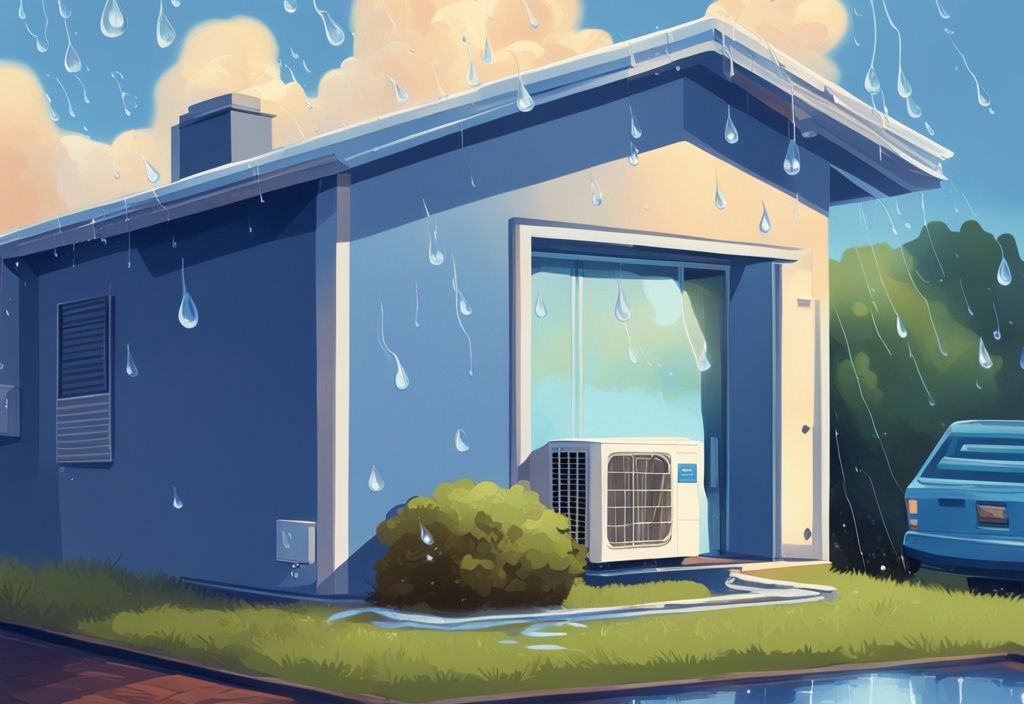
Possible Causes Leading to Water Noises After Rain
Ever wondered why your window AC sounds like water after rain? Several culprits could be causing this issue. Let’s explore them one by one.
Dirty Air Filters
When your window AC’s air filters get clogged with dirt and debris, it really messes things up. Blocked airflow can make the evaporator coil freeze. Once the rain stops and the coil thaws, you hear those water sounds as the ice melts away. Keep those filters clean or replace them regularly to avoid this hassle.
Low Refrigerant Level
A window AC sounds like water after rain when it’s low on refrigerant. Without enough refrigerant, the system can’t maintain the correct temperature, leading to a frozen coil. When that frozen coil starts to thaw, it produces water sounds. You’ll need a professional to recharge the refrigerant and check for leaks to get your system working optimally again.
Dirty Evaporator Coil
A dirty evaporator coil can throw everything off balance by disrupting proper airflow. This causes the coil to freeze, especially noticeable after rain due to outdoor temperature changes. As it thaws, it creates those annoying water noises. To dodge this issue, make sure you clean the evaporator coil regularly.
Broken Thermostat
Sometimes, a faulty thermostat is to blame when your window AC sounds like water after rain. A broken thermostat can cause improper cycling, which leads to an imbalanced temperature and, you guessed it, a frozen evaporator coil. As the system defrosts, you’ll hear running water sounds. Fixing or replacing the thermostat will help keep things running smoothly.
Blower Problems
The blower is critical for moving air over the coils. If it’s not working right, the evaporator coil freezes. After a rainstorm, when the coil starts to thaw, it can make water sounds. Make sure the blower is in good shape to prevent these issues.
Sensor Issues
Faulty sensors can mess up how your window AC cycles and operates. This can disrupt the condensation process, resulting in water noises. If the sensors can’t regulate temperatures effectively, the coil might freeze and thaw irregularly. Properly working sensors are key to a quiet and well-functioning AC unit.
Electrical Control Failures
Electrical problems like corroded wires or malfunctioning components can cause parts of your AC unit to fail, leading to those pesky water sounds. These issues can interfere with condensation, further complicating the situation. Addressing electrical problems promptly will ensure your AC runs smoothly without producing water noises after rain.
How to Check and Fix Common Window AC Water Noise Problems
Checking for Drain Blockages
If your window AC sounds like water after rain, one of the things you should check right away is the condensate drain line. Over time, dirt and debris can clog this drain line. When this happens, water accumulates and overflows, creating that pesky noise.
- Inspect the Drain Line: Regularly look for any blockages. A flashlight and a small brush can help you see and remove debris from the condensate line.
- Clear Obstructions: If you spot any blockages, use a flexible wire or pipe cleaner to gently remove them.
- Flush the Line: Occasionally flushing the drain line with water or a mild vinegar solution can help keep it free from build-up.
Tips and Safety Precautions
- Always turn off the power before inspecting or servicing your AC unit to avoid electrical hazards.
- Wear protective gloves and use appropriate tools to prevent injuries while clearing blockages.
Cleaning and Maintaining the Window AC Drainage System
Preventing those annoying water noises in your window AC after rain is all about regular cleaning and maintenance. Keeping the drainage system clean ensures smooth water flow and reduces the risk of overflow noises.
- Clean the Drain Pan: Regularly remove and clean the drainage pan. Use a mixture of water and vinegar to eliminate mold or mildew and prevent clogs.
- Maintain the Condensate Line: Inspect the condensate line for mold and dirt build-up. Flush it with water or a vinegar solution to keep it clear.
- Check for Leaks: Make sure there are no leaks in the drainage system that could cause water to pool and create noise.
Ensuring Proper Installation of the AC Unit
Proper installation is key to preventing water accumulation inside the unit, which can cause water noise after rain. The trick to proper drainage starts with ensuring that your window AC is installed correctly.
- Check the Tilt: Verify that the AC unit is slightly tilted outwards. This inclination helps water drain away from the unit instead of pooling inside.
- Adjust the Installation: If the unit isn’t properly tilted, reinstall or adjust it to the right angle. A level can help you ensure the correct tilt.
- Secure the Unit: Make sure the AC is firmly secured in the window frame to prevent any movement that might shift its angle over time.
Following these steps and maintaining your window AC regularly can nip most of those water noise issues in the bud. This hands-on approach helps keep your unit running smoothly and extends its lifespan.
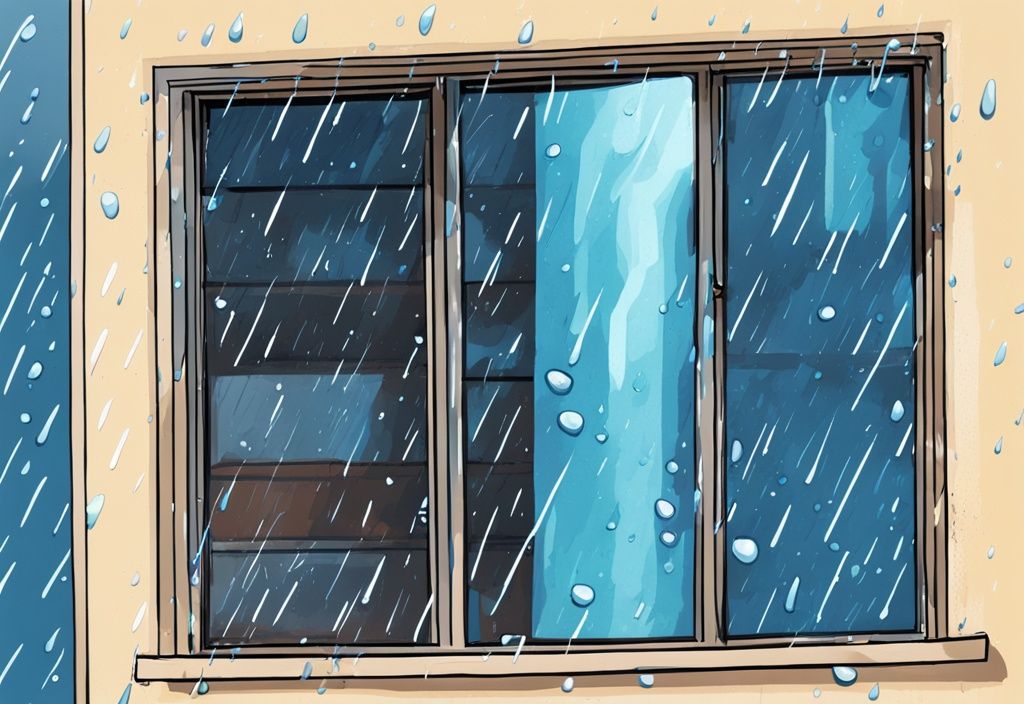
Professional Intervention and Maintenance Advice
When to Seek Professional Help
There are times when your trusty toolbox just won’t cut it, and calling in the pros becomes essential. If your window AC sounds like water after rain and basic troubleshooting techniques don’t fix the issue, it’s probably time to call a professional. Certain problems, like refrigerant leaks or substantial electrical issues, are better handled by experts to ensure both safety and efficiency.
- If your window AC sounds like water after rain and basic troubleshooting doesn’t resolve it, professional help may be needed.
- Suspected refrigerant leaks or significant electrical issues warrant expert intervention to ensure safety and efficiency.
Refrigerant Leaks
Refrigerant leaks are a whole other beast. These should always be dealt with by professionals due to the potential environmental and safety hazards involved. An experienced technician can detect and repair leaks early, which helps prevent extensive damage and maintains your AC unit’s overall health.
- Handling refrigerant leaks should always be done by professionals due to potential environmental and safety risks.
- Early detection and repair of leaks can prevent extensive damage and maintain the overall health of your AC unit.
The Importance of Routine Maintenance
A healthy AC unit is a happy AC unit. Engaging in routine maintenance is crucial, especially if you’re keen on preventing those pesky water noises after it rains. A well-set maintenance schedule should include tasks like cleaning the coils, replacing filters, and inspecting electrical components.
- Routine maintenance is essential to preemptively address issues before they become serious, particularly in preventing water noises after rain.
- A comprehensive maintenance schedule should include cleaning coils, replacing filters, and inspecting electrical components.
- Regular checks ensure optimal function and longevity of your window AC, avoiding costly repairs down the line.
Benefits of Regular Filter Replacement
Changing your AC’s filters regularly is a simple yet effective way to ensure smooth operation.
Clean filters promote good airflow, reducing the chances of coil freezing and the subsequent water noises after rain. Plus, it helps the unit run more efficiently and improves indoor air quality, which is an added health benefit.
- Regular filter replacement ensures clean airflow, reducing the likelihood of coil freezing and subsequent water noises after rain.
- Maintains efficient operation of the AC unit by preventing clogs and strain on the system.
- Improves indoor air quality, offering added health benefits while preventing many noise-related issues.
To wrap it up, combining timely professional intervention with consistent maintenance can significantly reduce those moments when your window AC sounds like water after rain. If your unit displays a Mitsubishi 4250 error code, addressing it promptly will also ensure smooth operation.
Regular upkeep is the golden ticket to a quiet, efficient, and long-lasting air conditioning unit.
The Role of Condensation in Window AC Units
Condensation is a critical aspect that helps your window AC unit keep your home cool and comfortable. By understanding its role, you can better manage your AC, especially during humid conditions like after a rainstorm.
The Condensation Process Explained
In a window air conditioner, condensation is a fundamental part of the cooling mechanism. When warm indoor air is drawn into the unit, it passes over the cold evaporator coils. This process causes the moisture in the air to condense, forming droplets.
These droplets then drip into a designated drain pan within the unit. This condensation process is essential for the air conditioner to remove humidity from your indoor environment, thereby enhancing the cooling effect.
The Necessary and Beneficial Role of Moisture
Moisture plays a pivotal role in any window AC unit. Controlled condensation helps the unit to regulate the indoor humidity levels, which in turn maintains a comfortable and cool indoor climate.
This is especially important after rain, when external humidity levels tend to be higher. However, if your window AC sounds like water after rain, it could be indicating an abnormal amount of moisture or other underlying issues such as clogged drains or improper installation.
Regular maintenance ensures that condensation is effectively managed, thereby optimizing the performance of your AC unit.
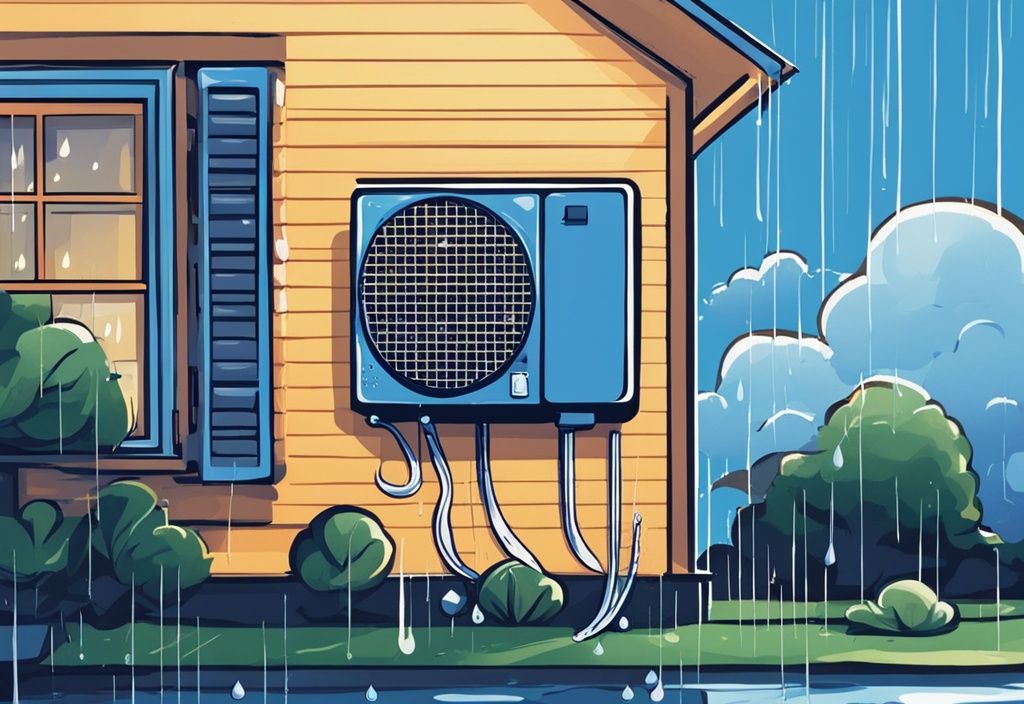
- Condensation removes excess humidity.
- Drip pan collects moisture.
- Proper drainage prevents issues.
Conclusion
Hearing water noises in your window AC after rain can definitely raise some eyebrows. Most of the time, the culprits are issues like condensation, blocked drains, or even a not-so-perfect installation. Increased humidity right after a rainstorm makes your AC work a little harder, leading to more condensation inside the unit. If the drain pan overflows or if water isn’t draining properly, you might hear those concerning dripping or splashing sounds.
Regular maintenance is your best friend here, and making sure your AC is properly installed goes a long way. To learn more about the importance of maintaining your air conditioning system, including tips on how to keep it running efficiently, check out this guide on maintaining your air conditioner. Keep those air filters clean, and do a routine check for any clogged drain lines. If you’re experiencing issues with your car’s air conditioning, such as a Honda Civic AC not working, make sure to troubleshoot or consult a professional.
Also, make sure your unit is slightly tilted outwards. This little trick helps with proper drainage and can significantly cut down on water-related noises.
If those water sounds stick around or start sounding unusual even after you’ve tried troubleshooting, it might be time to call in the pros. Early intervention can save you from bigger headaches like refrigerant leaks or electrical issues. These can lead to more problems and possibly some hefty repair bills.
By staying on top of maintenance and tackling issues as they pop up, you’ll keep your window AC running smoothly and quietly, even after heavy rain. This not only keeps you comfortable but also extends the life of your air conditioning unit. So, in the end, a little proactive care pays off big time, keeping your AC in great shape for years to come.
FAQs
Why does my window AC sound like water after rain even when it hasn’t rained?
- There are a few reasons why your window AC might sound like water. Internal condensation is a common cause, which can happen with regular use.
- A dirty air filter often exacerbates this issue, making it crucial to keep filters clean and free of debris.
- Sometimes, a clogged drain line can be the culprit. Ensuring your drain line is clear will help prevent that annoying water noise.
Regular maintenance is key to keeping these issues at bay. It’s like giving your AC a little TLC, preventing it from causing a racket. Remember, a well-maintained AC is a happy AC!
Is it normal for my window AC to make water noises?
- Absolutely, some water noise is perfectly normal. It’s part of the condensation process which occurs naturally when the unit is cooling your space.
- However, if the noises become excessive or start to sound unusual, it might be a sign of a problem that needs attention.
Think of your AC as a good friend. A little chitchat is fine, but if it starts yelling for attention, it’s time to check out what’s going on!
Can I fix a water noise issue in my window AC myself?
- For minor issues, like cleaning or replacing air filters and clearing out clogged drain lines, a DIY approach is often effective.
- If you come across something more serious, such as a refrigerant leak, it’s best to call in a professional. Safety first, always!
It’s great to be handy, but know your limits. There’s no shame in calling for backup when things go beyond basic maintenance.
How often should I clean my window AC to prevent water noises?
- Cleaning your AC unit and replacing filters every three months is a good rule of thumb. This keeps your unit running smoothly and quietly.
- Beyond your regular cleanings, an annual professional maintenance check can catch potential issues before they become problems.
Think of these maintenance checks as yearly physicals for your AC. A little care goes a long way in preventing those pesky water noises.
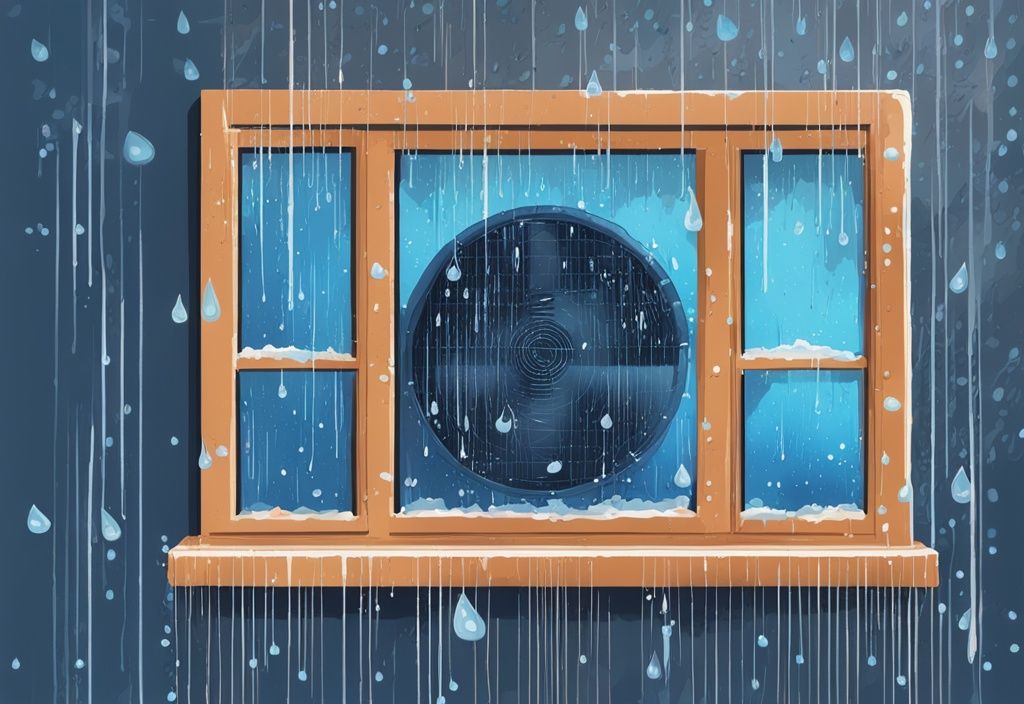
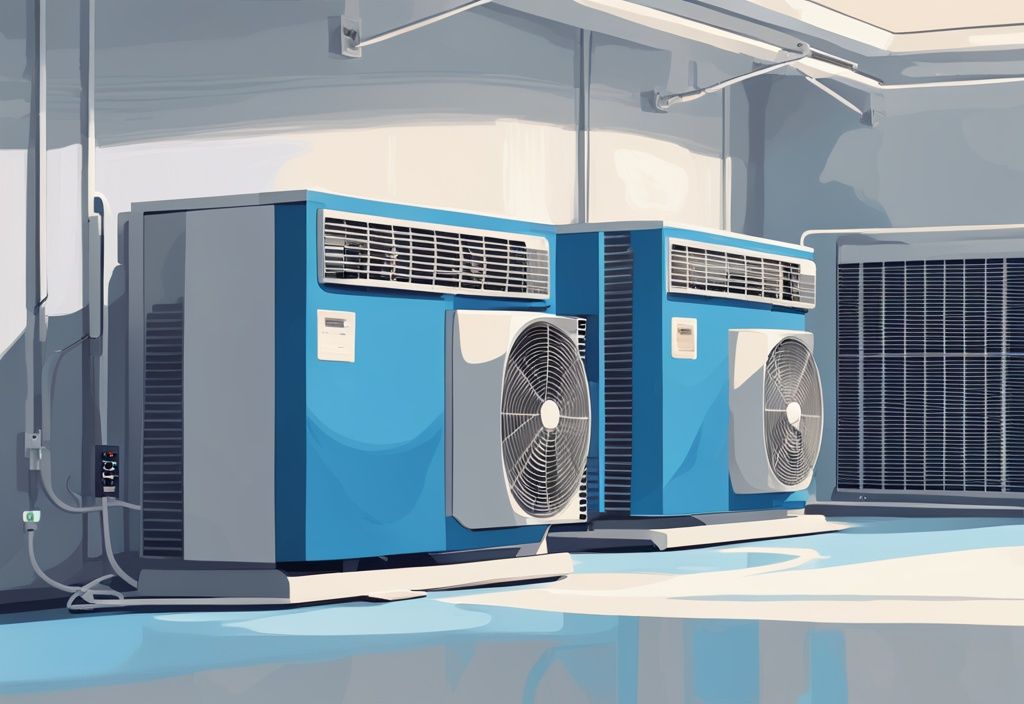

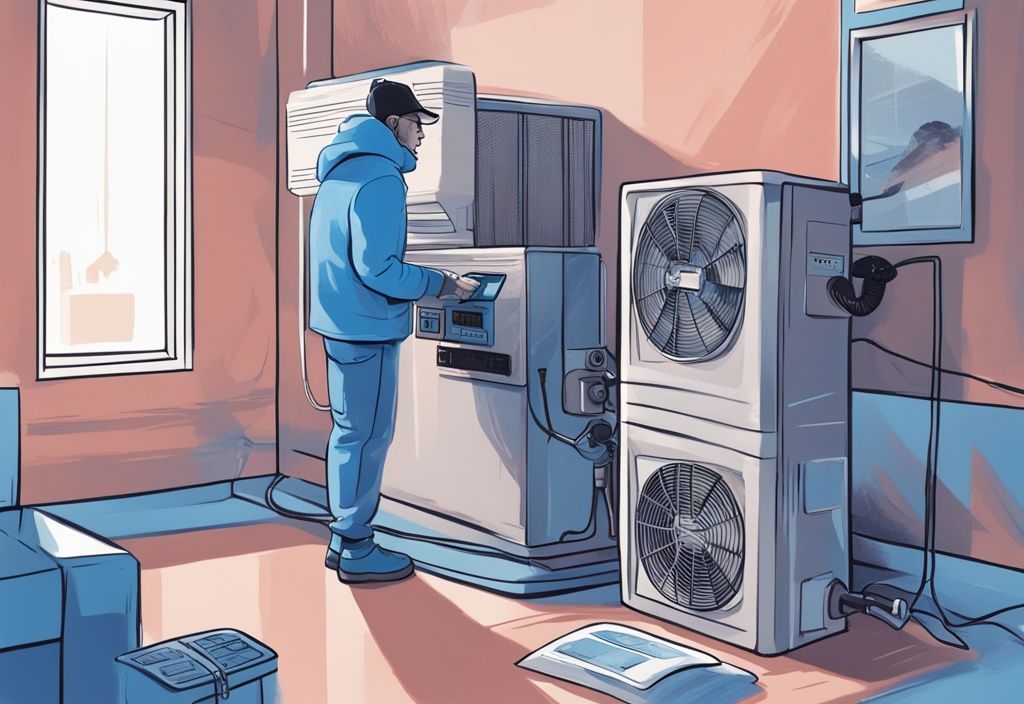
Post Comment